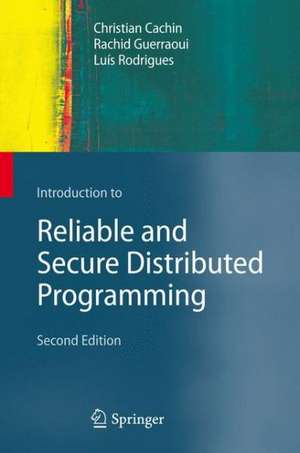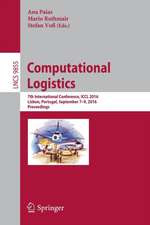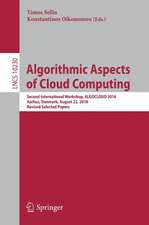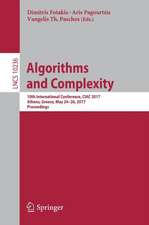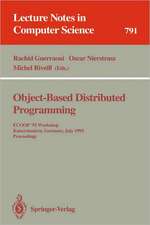Introduction to Reliable and Secure Distributed Programming
Autor Christian Cachin, Rachid Guerraoui, Luís Rodriguesen Limba Engleză Paperback – 14 oct 2014
Cachin, Guerraoui, and Rodrigues present an introductory description of fundamental distributed programming abstractions together with algorithms to implement them in distributed systems, where processes are subject to crashes and malicious attacks. The authors follow an incremental approach by first introducing basic abstractions in simple distributed environments, before moving to more sophisticated abstractions and more challenging environments. Each core chapter is devoted to one topic, covering reliable broadcast, shared memory, consensus, and extensions of consensus. For every topic, many exercises and their solutions enhance the understanding
This book represents the second edition of "Introduction to Reliable Distributed Programming". Its scope has been extended to include security against malicious actions by non-cooperating processes. This important domain has become widely known under the name "Byzantine fault-tolerance".
| Toate formatele și edițiile | Preț | Express |
|---|---|---|
| Paperback (1) | 393.77 lei 6-8 săpt. | |
| Springer Berlin, Heidelberg – 14 oct 2014 | 393.77 lei 6-8 săpt. | |
| Hardback (1) | 505.05 lei 3-5 săpt. | +28.78 lei 6-10 zile |
| Springer Berlin, Heidelberg – 12 feb 2011 | 505.05 lei 3-5 săpt. | +28.78 lei 6-10 zile |
Preț: 393.77 lei
Preț vechi: 492.22 lei
-20% Nou
Puncte Express: 591
Preț estimativ în valută:
75.36€ • 81.83$ • 63.30£
75.36€ • 81.83$ • 63.30£
Carte tipărită la comandă
Livrare economică 23 aprilie-07 mai
Preluare comenzi: 021 569.72.76
Specificații
ISBN-13: 9783642423277
ISBN-10: 3642423272
Pagini: 388
Ilustrații: XIX, 367 p.
Dimensiuni: 155 x 235 x 20 mm
Greutate: 0.54 kg
Ediția:2nd ed. 2011
Editura: Springer Berlin, Heidelberg
Colecția Springer
Locul publicării:Berlin, Heidelberg, Germany
ISBN-10: 3642423272
Pagini: 388
Ilustrații: XIX, 367 p.
Dimensiuni: 155 x 235 x 20 mm
Greutate: 0.54 kg
Ediția:2nd ed. 2011
Editura: Springer Berlin, Heidelberg
Colecția Springer
Locul publicării:Berlin, Heidelberg, Germany
Public țintă
GraduateCuprins
1. Introduction. - 2. Basic Abstractions. - 3. Reliable Broadcast. - 4. Shared Memory. -
Notă biografică
Rachid Guerraoui is Professor in the School of Computer and Communication Sciences (LPD), at EPFL in Lausanne, Switzerland. Luís E. T. Rodrigues is Professor (Professor Catedrático) at the Departamento de Engenharia Informática, Instituto Superior Técnico (IST), at the Universidade Técnica de Lisboa in Portugal. Christian Cachin works at IBM Research in Zurich, Switzerland.
Textul de pe ultima copertă
In modern computing a program is usually distributed among several processes. The fundamental challenge when developing reliable and secure distributed programs is to support the cooperation of processes required to execute a common task, even when some of these processes fail. Failures may range from crashes to adversarial attacks by malicious processes.
Cachin, Guerraoui, and Rodrigues present an introductory description of fundamental distributed programming abstractions together with algorithms to implement them in distributed systems, where processes are subject to crashes and malicious attacks. The authors follow an incremental approach by first introducing basic abstractions in simple distributed environments, before moving to more sophisticated abstractions and more challenging environments. Each core chapter is devoted to one topic, covering reliable broadcast, shared memory, consensus, and extensions of consensus. For every topic, many exercises and their solutions enhance the understanding
This book represents the second edition of "Introduction to Reliable Distributed Programming". Its scope has been extended to include security against malicious actions by non-cooperating processes. This important domain has become widely known under the name "Byzantine fault-tolerance".
Cachin, Guerraoui, and Rodrigues present an introductory description of fundamental distributed programming abstractions together with algorithms to implement them in distributed systems, where processes are subject to crashes and malicious attacks. The authors follow an incremental approach by first introducing basic abstractions in simple distributed environments, before moving to more sophisticated abstractions and more challenging environments. Each core chapter is devoted to one topic, covering reliable broadcast, shared memory, consensus, and extensions of consensus. For every topic, many exercises and their solutions enhance the understanding
This book represents the second edition of "Introduction to Reliable Distributed Programming". Its scope has been extended to include security against malicious actions by non-cooperating processes. This important domain has become widely known under the name "Byzantine fault-tolerance".
Caracteristici
Introduces fundamental reliable and secure distributed programming abstractions, and offers algorithms to implement these abstractions Incremental approach explores basic abstractions before moving to more sophisticated concepts The book functions as a complete practical reference to the basics of reliable distributed programming applications Includes a companion set of running examples implemented in Java Includes supplementary material: sn.pub/extras
